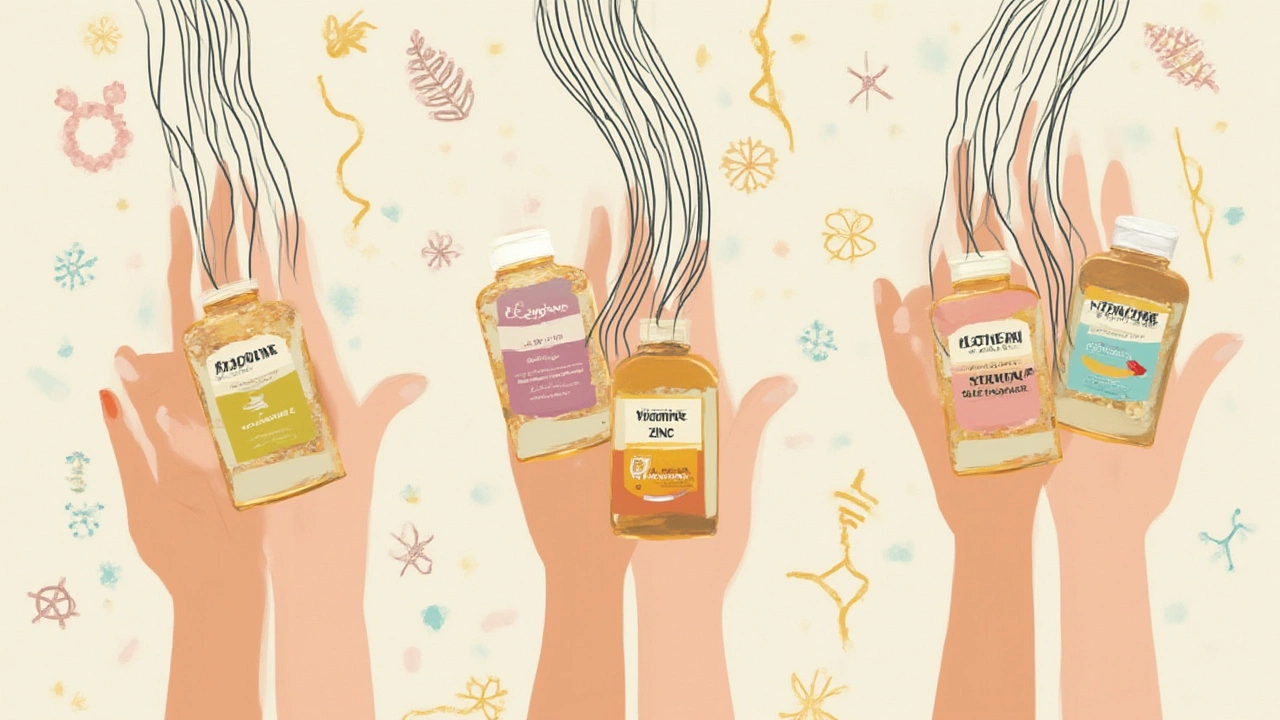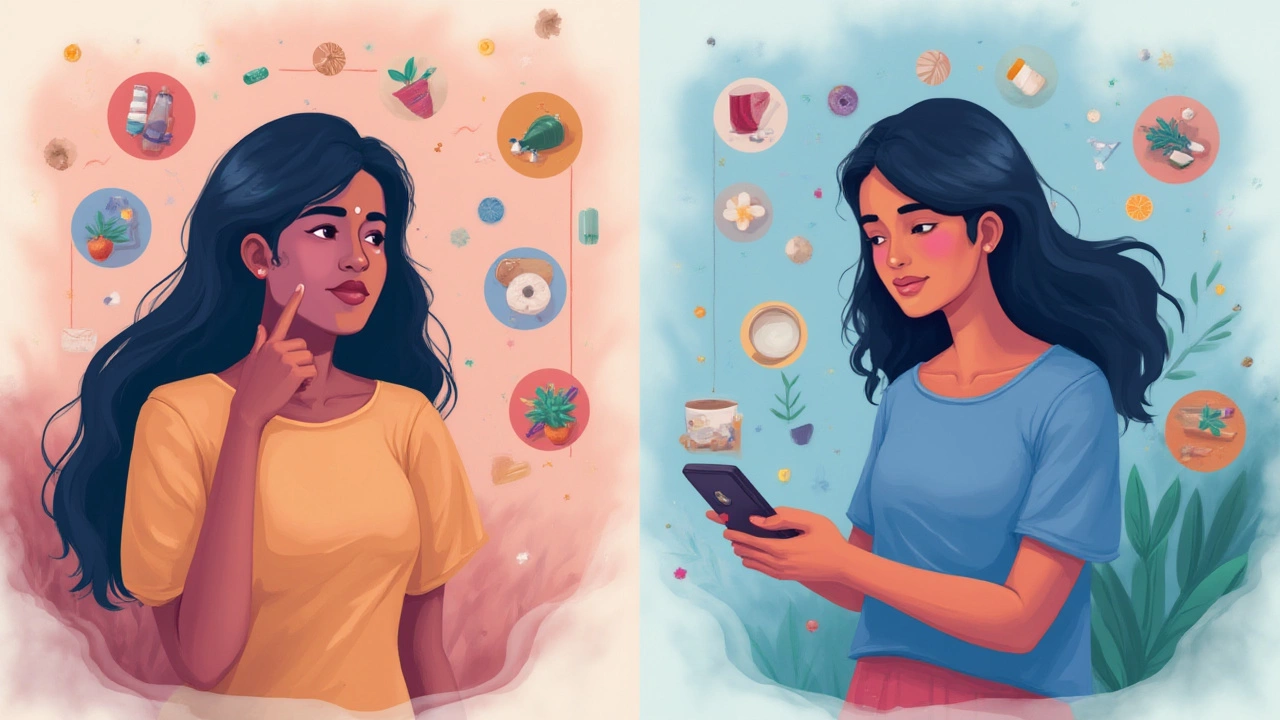Ever felt that sinking feeling when you spot extra hair in your brush or clogging the shower drain? You're definitely not the only one. Search data from Australia shows that interest in hair growth has jumped 30% in the last year alone. People will try almost anything—exotic oils, scalp massages, even standing on their head for half an hour. But what if it’s as simple as adjusting your vitamin intake?
Let’s cut through the noise. Are there really vitamins that speed up hair growth, or is this yet another myth like those hair gummies influencers keep holding up? Grab your cuppa, because we’re digging into the facts, not the fads.
How Hair Grows: What Your Body Actually Needs
Think of your hair like a plant. It needs the right nutrients—vitamins, minerals, and proteins—to grow thick and healthy. If you’re low on the basics, your hair gets the short straw. It goes dull, brittle, and might even stop growing altogether. So, what’s happening on that scalp of yours?
Hair grows from follicles in your skin. The growth cycle has three main phases: anagen (growing), catagen (transition), and telogen (resting). Most of your hair—around 85%—is in the growing phase at any time. But things like stress, poor diet, or sickness can make more follicles jump to resting or, even worse, shedding.
Let’s get real for a second: the claims that you can grow hair like Rapunzel overnight are just marketing. On average, scalp hair grows half an inch (about 1.25 cm) per month, or 15 cm (around 6 inches) per year. No pill or powder is going to triple that speed. What you can do is make sure nothing slows it down.
In Sydney, I’ve seen mates try everything under the sun after beach season—because salty water and sunhammer their hair. But science tells us that true growth comes from inside. Blood has to deliver everything those follicles need—if you’re running low, the hair’s first to suffer. Being deficient in just one key vitamin can throw the whole system out of whack.
Check out this breakdown of hair growth phases, so you get why nutrients matter at every stage:
| Hair Growth Phase | Duration | What Happens |
|---|---|---|
| Anagen (Growing) | 2-7 years | Hair grows about 1-1.5 cm a month |
| Catagen (Transition) | 2-3 weeks | Follicle shrinks, hair stops growing |
| Telogen (Resting) | 3-4 months | Hair sheds and new hair starts growing |
If you want thicker, faster-growing hair, you need to focus on boosting the anagen phase and making sure it doesn’t get cut short.

The Most Powerful Hair Growth Vitamins (And How They Actually Help)
You see biotin and collagen powders flying off shelves and filling your Instagram feed, but are they worth it? Let’s separate the hype from science. Here’s a rundown of the vitamins your hair follicle craves the most.
- Biotin (Vitamin B7): Biotin has reached superstar status, and for a reason. Deficiency in biotin can cause hair thinning and slow growth. It helps produce keratin, the key protein in hair. You find biotin in eggs, almonds, sweet potatoes, and spinach. Unless you’re really low on it, though, doubling up doesn’t make your hair grow in hyper-speed.
- Vitamin D: Low sunlight in the Aussie winter (or too much sunscreen) means a lot of us are low on vitamin D. Multiple medical studies link low vitamin D with hair loss, especially a type called alopecia areata. The body needs it to create new hair follicles. You get vitamin D from sunlight, fatty fish, eggs, and fortified milk.
- Iron: This one surprises most people. Iron deficiency is a massive cause of hair loss, especially in women. Iron helps your red blood cells carry oxygen to cells—including those precious hair roots. If you’re low, new hair can’t grow properly. Spinach, red meat, lentils, and pumpkin seeds help fill that gap.
- Zinc: A powerhouse for repairing hair tissue and keeping follicles strong. Even a mild deficiency can lead to obvious shedding. Oysters, beef, beans, and cashews are all zinc-rich. Getting the right amount fuels fast, healthy regrowth.
- Vitamin C: You probably know it helps fend off winter bugs, but it’s also crucial for your hair. Vitamin C helps the body absorb iron and creates collagen. Strawberries, citrus, and capsicum will load you up on this one.
- Vitamin E: This antioxidant protects scalp cells and locks in moisture—think less brittle, more shiny hair. Avocado, sunflower seeds, and spinach are great options.
- Vitamin A: Needed for cell growth, but balance matters. Too much vitamin A can actually trigger hair loss. So, stick to a diet rich in carrots, pumpkin, and leafy greens—no need to megadose.
Here’s a quick look at some key vitamins and where you get them:
| Vitamin | Main Benefit for Hair | Good Food Sources |
|---|---|---|
| Biotin (B7) | Keeps hair strong, reduces shedding | Eggs, almonds, spinach |
| Vitamin D | Stimulates new hair follicles | Sunlight, salmon, eggs |
| Iron | Supports follicle growth | Red meat, lentils, pumpkin seeds |
| Zinc | Repairs and grows tissue | Oysters, beans, cashews |
| Vitamin C | Boosts iron absorption | Citrus, strawberries, capsicum |
| Vitamin E | Moisturizes, strengthens scalp | Avocado, sunflower seeds |
What do the studies say? A 2022 Sydney University trial found that women who corrected iron and vitamin D deficiencies saw up to 15% faster hair regrowth over four months. That’s not magic, but it’s real results. Biotin supplements only make a difference if you’re actually low to begin with—no mega gains for people already eating a varied diet.
Some vitamins are best left in food. Overloading on vitamin A or iron (without medical advice) can actually backfire. One poor guy at my gym saw his hair thinning faster after taking triple his daily needs thinking he’d hack the growth cycle. Don’t play chemist—get tested if you think you’re low.
If you want to speed up hair growth, look at your diet first. Supplements can help plug gaps, but they’re not miracle workers. And watch out for those multi-vitamin ‘hair, skin, nails’ formulas—they’re often pure marketing, with doses so low you’d need to eat the whole bottle to notice any difference (don’t try this at home, obviously).

Smart Tips to Maximize Hair Growth—Beyond Vitamins
Now that we’ve covered the best vitamins for hair growth, what can you actually do starting today? Some tricks make a real difference, even if they sound simple. Your scalp is living skin, and like any other part of your body, it needs proper care and a little discipline.
- Get Your Levels Checked: If your hair is thinning or just won’t grow, ask your GP for a blood test. Low iron, vitamin D, or zinc are often at the root of stubborn hair issues—especially if you’re vegetarian or live somewhere that’s more rainy than sunny (hello, Melbourne friends).
- Eat the Rainbow: Colour on your plate means you’re getting a mix of nutrients. Try tossing nuts and seeds on salads, eat plenty of dark green veg, and don’t skip protein. Hair is made of keratin—a protein—so shake up your meals with eggs, fish, legumes, and lean meats.
- Ease Up on the Heat and Chemicals: It’s not just about what goes in your body, but what you put on your head. If you’re always straightening, curling, or bleaching, hair breaks faster than it grows. Use deep conditioners and oil treatments—think coconut, argan, or jojoba—once or twice a week.
- Rethink Your Hair Gummies: Those colorful hair vitamins popping up on TikTok and Instagram rarely beat real food. Vihaan, my son, loved the fruity taste, but they’re basically fancy lollies with a vitamin label—good luck getting serious results.
- Massage Your Scalp: Massaging your scalp for just five minutes daily can boost circulation to hair follicles. It’s free, feels fantastic, and some studies say it really does help thicken hair over time.
- Stay Hydrated: Dehydration dries out more than your mouth. Drinking enough water keeps hair flexible and less prone to breakage. Aim for 2-3 litres a day, especially after a beach day or gym session.
- Handle with Care: Don’t brush wet hair hard, skip tight ponytails, and pat hair dry with a soft towel. Morning rushes might make you skip these, but your future self will thank you.
So, which vitamin actually grows hair the fastest? The honest answer: the one you were missing. If you’re perfect on everything, you won’t see new hair sprouting just from upping your dose. But if you’ve been running low—especially on iron, vitamin D, or biotin—fixing that is the fastest way to kickstart growth. Data from trichologists in Australia shows that correcting a single nutrient gap can cut hair shedding in half within three months. Don’t forget, this is a slow game. Stick to your routine, eat well, and protect those strands.
Hair doesn’t just need a pill. It needs a whole-body approach—one that feeds it, protects it, and gives it a fighting chance. If you’re losing more hair than usual or noticing bald patches, talk to your doctor, not just a vitamin store clerk. Sometimes, there’s an underlying problem—hormones, thyroid, or even stress—that vitamins alone won’t fix. Keep an eye on those locks, feed your scalp properly, and let time (and good habits) do their work.
